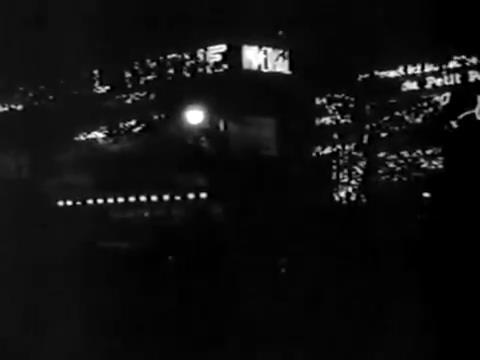Penn of
Pennsylvania
Mr. Penn passes out from Roman England like a Moses contemporary
to Pepys (who appears in a cameo). Deborah Kerr’s lapidary Guli makes the
call, shall one say, a pleasure. Noel Coward & David Lean signalled SOS and
no mistake, Lance Comfort smokes a peace-pipe with Brother Jonathan, and
observes him graciously, with an eye to the Hollywood biopic that he ornaments
and advances, pivotally.
Hatter’s Castle
Hitler, a social-climbing nutter, so clearly spelled out that no
sane man could miss it.
All the critics did, Bosley Crowther of the New York Times
(who saw it in 1948, “a violent and painful film... but too much
monstrousness grows weighty toward the end”), Variety, Time Out
Film Guide (Tom Milne), Halliwell’s Film Guide.
James Mason as the doctor has the opposite role in
Crabtree’s They Were Sisters, exactly misunderstood in the same
way, by critics.
Impossible, but it really happened.
Comfort’s style and technique are extremely fine, with a
special forte of extreme close-ups brought about by the actors moving
fortuitously, as it were.
The ending is famously favored by Hammer.
Old Mother Riley
Detective
It opens quite like All
the President’s Men (dir. Alan J. Pakula) with a break-in at the Food
Offices, a very clever dick from C.I.D. brushes aside the notion that Mrs.
Riley the voluntary char (“her war work”) had anything doing and
puts her on the scent of the black market, “really, definitely,
actually!”
Everything is rationed because of the war, but Comfort and his
cast and crew give measure still for measure, there is nothing at all more fun
than a barrel full of Old Mother Riley.
“That’s what all my boyfriends tell me.”
TV Guide, “a
lifeless effort.”
Bedelia
A fine analytical recognition of Tourneur’s Cat People,
witness the jokes, on a murderess who converts men and their way of life into
money.
The ending is already foreseen in Hatter’s Castle,
the postwar perspective still adds a tang nonetheless.
“Pretty much of a disappointment” (Bosley Crowther, New
York Times, who couldn’t make head nor tail of it).
“Dreary upper-class British murder drama,” says Halliwell’s
Film Guide, “totally devoid of style or suspense but a big star hit
of the time.”
Silent Dust

Three years after the war, three years before Jeux interdits
(dir. René Clément), a monument to the fallen in the form of a sports pavilion,
erected by his blind parvenu father that “his memory shall live,” a
deserter. This is subsequently analyzed in Don Chaffey’s Time Is My Enemy. “At last I
limped into Brussels more dead than alive.” The filming recalls
Cukor’s Holiday and The Philadelphia Story, two sides of a
theme, except the flashback sequence on the Continent belied by the narration,
and where Jacques Becker finds resolution in a dream for Antoine et Antoinette, Comfort represents the blind man’s
mind as it pieces together its various distant encounters with the party absent
to its reason, who must be there.
There is a pivotal spiral staircase (see Siodmak or Collinson),
with Auric’s score to complete the image. “The peace hasn’t
turned out quite as well as we’d hoped. Since we got back to the manor,
my wife’s been doing all the cooking and seldom gets further than the pigsties.”
T.M.P. of the New York
Times fell back on the old “stagebound”
ploy, a venerable standby for movie reviewers caught napping. “Effective
stage melodrama,” says Halliwell’s
Film Guide, “quite neatly filmed.”
Make Mine a Million
A perfect work on the work of art that never sees the light of
day in the daylight robbery that is the national concern, or so it says, the
national concern.
There are two television networks, all depends on them,
housewives won’t buy a product if it isn’t advertised on telly,
that’s all.
One network takes no adverts at all, the other takes a pile of
cash per, it’s impossible, one must organize a “wartime underground
movement” on pirated airtime to get anywhere at all.
The product is Bonko, a detergent of many properties, developed over
twelve years by a top research scientist and his team of dedicated colleagues,
“guarded day and night by the secret police of a country that shall be
nameless, you know it.”
Our man on the music halls is now reduced to titivating TV
types, he works the caper with a pulled cable there and another plugged-in
here, the nation is captivated.
It comes down to him in the back of a mail van driven by two
robbers in post office uniforms.
Tomorrow at Ten
London kidnapping case, small boy, large ransom, time bomb in
golliwog.
Scotland Yard fails to meet the deadline, however the wee tyke
upon waking has decided to give the golliwog a bath, soap and all, bomb
defused.
The British Film Institute reports a “lukewarm”
critical reception, and latterly commends the film as having plot elements that
“subvert generic expectations”.
“Well acted and efficiently done,” says Halliwell’s Film Guide, thereby
summing up the significance and the beautiful, concentrated filming of a
“terse second feature.”